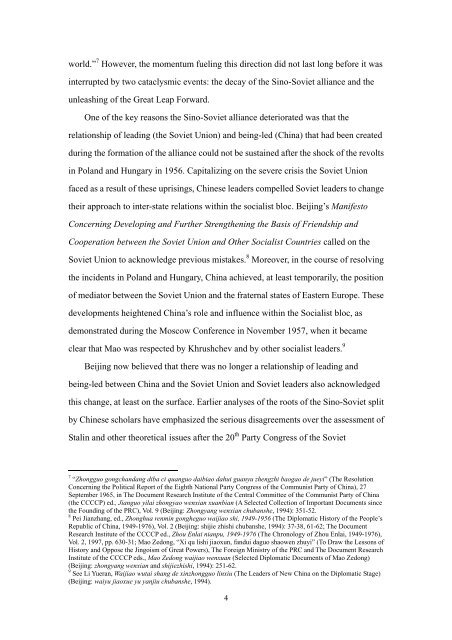1962: The Eve of the Left Turn in China's Foreign Policy - Claude Arpi
1962: The Eve of the Left Turn in China's Foreign Policy - Claude Arpi
1962: The Eve of the Left Turn in China's Foreign Policy - Claude Arpi
Create successful ePaper yourself
Turn your PDF publications into a flip-book with our unique Google optimized e-Paper software.
world.” 7 However, <strong>the</strong> momentum fuel<strong>in</strong>g this direction did not last long before it was<strong>in</strong>terrupted by two cataclysmic events: <strong>the</strong> decay <strong>of</strong> <strong>the</strong> S<strong>in</strong>o-Soviet alliance and <strong>the</strong>unleash<strong>in</strong>g <strong>of</strong> <strong>the</strong> Great Leap Forward.One <strong>of</strong> <strong>the</strong> key reasons <strong>the</strong> S<strong>in</strong>o-Soviet alliance deteriorated was that <strong>the</strong>relationship <strong>of</strong> lead<strong>in</strong>g (<strong>the</strong> Soviet Union) and be<strong>in</strong>g-led (Ch<strong>in</strong>a) that had been createddur<strong>in</strong>g <strong>the</strong> formation <strong>of</strong> <strong>the</strong> alliance could not be susta<strong>in</strong>ed after <strong>the</strong> shock <strong>of</strong> <strong>the</strong> revolts<strong>in</strong> Poland and Hungary <strong>in</strong> 1956. Capitaliz<strong>in</strong>g on <strong>the</strong> severe crisis <strong>the</strong> Soviet Unionfaced as a result <strong>of</strong> <strong>the</strong>se upris<strong>in</strong>gs, Ch<strong>in</strong>ese leaders compelled Soviet leaders to change<strong>the</strong>ir approach to <strong>in</strong>ter-state relations with<strong>in</strong> <strong>the</strong> socialist bloc. Beij<strong>in</strong>g’s ManifestoConcern<strong>in</strong>g Develop<strong>in</strong>g and Fur<strong>the</strong>r Streng<strong>the</strong>n<strong>in</strong>g <strong>the</strong> Basis <strong>of</strong> Friendship andCooperation between <strong>the</strong> Soviet Union and O<strong>the</strong>r Socialist Countries called on <strong>the</strong>Soviet Union to acknowledge previous mistakes. 8 Moreover, <strong>in</strong> <strong>the</strong> course <strong>of</strong> resolv<strong>in</strong>g<strong>the</strong> <strong>in</strong>cidents <strong>in</strong> Poland and Hungary, Ch<strong>in</strong>a achieved, at least temporarily, <strong>the</strong> position<strong>of</strong> mediator between <strong>the</strong> Soviet Union and <strong>the</strong> fraternal states <strong>of</strong> Eastern Europe. <strong>The</strong>sedevelopments heightened Ch<strong>in</strong>a’s role and <strong>in</strong>fluence with<strong>in</strong> <strong>the</strong> Socialist bloc, asdemonstrated dur<strong>in</strong>g <strong>the</strong> Moscow Conference <strong>in</strong> November 1957, when it becameclear that Mao was respected by Khrushchev and by o<strong>the</strong>r socialist leaders. 9Beij<strong>in</strong>g now believed that <strong>the</strong>re was no longer a relationship <strong>of</strong> lead<strong>in</strong>g andbe<strong>in</strong>g-led between Ch<strong>in</strong>a and <strong>the</strong> Soviet Union and Soviet leaders also acknowledgedthis change, at least on <strong>the</strong> surface. Earlier analyses <strong>of</strong> <strong>the</strong> roots <strong>of</strong> <strong>the</strong> S<strong>in</strong>o-Soviet splitby Ch<strong>in</strong>ese scholars have emphasized <strong>the</strong> serious disagreements over <strong>the</strong> assessment <strong>of</strong>Stal<strong>in</strong> and o<strong>the</strong>r <strong>the</strong>oretical issues after <strong>the</strong> 20 th Party Congress <strong>of</strong> <strong>the</strong> Soviet7 “Zhongguo gongchandang diba ci quanguo daibiao dahui guanyu zhengzhi baogao de jueyi” (<strong>The</strong> ResolutionConcern<strong>in</strong>g <strong>the</strong> Political Report <strong>of</strong> <strong>the</strong> Eighth National Party Congress <strong>of</strong> <strong>the</strong> Communist Party <strong>of</strong> Ch<strong>in</strong>a), 27September 1965, <strong>in</strong> <strong>The</strong> Document Research Institute <strong>of</strong> <strong>the</strong> Central Committee <strong>of</strong> <strong>the</strong> Communist Party <strong>of</strong> Ch<strong>in</strong>a(<strong>the</strong> CCCCP) ed., Jianguo yilai zhongyao wenxian xuanbian (A Selected Collection <strong>of</strong> Important Documents s<strong>in</strong>ce<strong>the</strong> Found<strong>in</strong>g <strong>of</strong> <strong>the</strong> PRC), Vol. 9 (Beij<strong>in</strong>g: Zhongyang wenxian chubanshe, 1994): 351-52.8 Pei Jianzhang, ed., Zhonghua renm<strong>in</strong> gongheguo waijiao shi, 1949-1956 (<strong>The</strong> Diplomatic History <strong>of</strong> <strong>the</strong> People’sRepublic <strong>of</strong> Ch<strong>in</strong>a, 1949-1976), Vol. 2 (Beij<strong>in</strong>g: shijie zhishi chubanshe, 1994): 37-38, 61-62; <strong>The</strong> DocumentResearch Institute <strong>of</strong> <strong>the</strong> CCCCP ed., Zhou Enlai nianpu, 1949-1976 (<strong>The</strong> Chronology <strong>of</strong> Zhou Enlai, 1949-1976),Vol. 2, 1997, pp. 630-31; Mao Zedong, “Xi qu lishi jiaoxun, fandui daguo shaowen zhuyi” (To Draw <strong>the</strong> Lessons <strong>of</strong>History and Oppose <strong>the</strong> J<strong>in</strong>goism <strong>of</strong> Great Powers), <strong>The</strong> <strong>Foreign</strong> M<strong>in</strong>istry <strong>of</strong> <strong>the</strong> PRC and <strong>The</strong> Document ResearchInstitute <strong>of</strong> <strong>the</strong> CCCCP eds., Mao Zedong waijiao wenxuan (Selected Diplomatic Documents <strong>of</strong> Mao Zedong)(Beij<strong>in</strong>g: zhongyang wenxian and shijiezhishi, 1994): 251-62.9 See Li Yueran, Waijiao wutai shang de x<strong>in</strong>zhongguo l<strong>in</strong>xiu (<strong>The</strong> Leaders <strong>of</strong> New Ch<strong>in</strong>a on <strong>the</strong> Diplomatic Stage)(Beij<strong>in</strong>g: waiyu jiaoxue yu yanjiu chubanshe, 1994).4

















